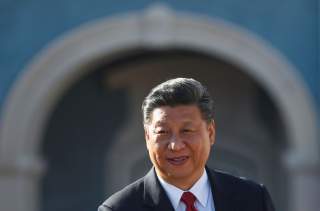Trump Has More Arrows in His Trade War Quiver Than Xi—For Now
Washington's advantage might not last.
President Trump’s and President Xi’s recent truce agreement to freeze the U.S.-China trade war for ninety days, while buying time for further negotiations, leaves major sticking points between both countries unresolved. Despite complications arising from the December 1 arrest of Chinese tech company Huawei CFO Meng Wanzhou by Canada at the request of U.S. authorities—a situation that threatens to damage U.S.-China trade talks—President Trump for the time being enjoys certain advantages in the standoff.
There is evidence that Chinese policymakers want to resolve the trade war quickly due to the threat that the prolonged dispute poses to China’s already-slowing economy. China’s economy has been slowing in 2018 with GDP growing at 6.5 percent in the third quarter, missing economists’ forecasts of 6.6% and amounting to the weakest quarterly growth since the global financial crisis of 2009.
Causes of the slowdown include the country’s transition from an export-dependent and investment-based economy to one powered by domestic consumption. In addition, efforts by the Beijing to deleverage and reduce the central government’s total eye-watering 300 percent of Gross Domestic Product (GDP) national debt. Moreover, the longstanding struggle of private firms facing systematic disadvantages in competing with state-owned enterprises has slowed the economy as has a contraction of government-backed infrastructure spending. Finally, a slowdown in the manufacturing sector and the effects of U.S. tariffs on Chinese goods has contributed to weaker growth.
It’s likely that Xi wants to see the trade war resolved sooner rather than later given the disproportionate effect of trade on the Chinese economy when compared to that of the United States. China’s exports to America amounts to a larger segment of the Chinese economy than the amount to which China-bound U.S. exports represent to the U.S. economy. Consider that last year China exported $500 billion worth of goods to America out of a total Chinese economy of $12 trillion, whereas the U.S. exported $130 billion goods to China out of its GDP of $19 trillion.
For these reasons, the trade war is likely to cause setbacks to China’s economic outlook. This works against Xi and his credibility since the Communist Party is expected to deliver economic stability to the Chinese people in exchange for having a monopoly of the country’s political power and governing authority. Xi cannot afford to have further slowing and contracting of the Chinese economy.
Due to these factors, the Chinese would like for an accord to be reached and odds are they will be willing to make reasonable concessions on the reduction of the bilateral trade deficit and tariff levels. This works to Trump’s advantage.
However, as it stands now, Washington’s demand that China abandons its decades-long economic model of forced technology transfer, intellectual property theft and state support for its high-tech strategy will likely go unheeded for the time being and may require a separate series of summits further down the road.
It bears saying that a complicating factor in China’s negotiations with foreign entities is Beijing’s aversion to being seen as backing down to foreign pressure—in this case Trump—and the Chinese are willing to go to great lengths to avoid these optics.
Nonetheless, some analysts believe that part of Beijing’s strategy is to wait out Trump, making bare-minimum commitments during his time in office while holding out for a more accommodating administration to come to power. This approach may yield dividends for Xi if the U.S. economy enters a recession, if American public opinion sours on the trade war or if Trump’s time in office ends without a resolution to the stalemate.
There has been fallout to Mr. Trump’s trade war with China. Markets have been jittery to rocky, with U.S. market gains for 2018 being wiped out on concerns about prolonged tensions and by investors’ uncertainty about the details of the ninety-day truce. This past week, confusion arose after U.S. National Economic Council Director Larry Kudlow backtracked on Mr. Trump’s announcement that Beijing had agreed to reduce tariffs on U.S.-made automobiles.
To Trump’s and Xi’s credit, the trade war ceasefire negotiated in Buenos Aires on December 1 allowed both countries to avert a more serious trade war and broader economic conflict. Washington agreed to delay plans to raise tariffs on $200 billion worth of Chinese goods from 10 percent to 25 percent in exchange for China entering discussions on making key structural changes to its economic model, purchasing increased amounts of U.S.-made goods and cracking down on fentanyl exporters. Yet, it will be difficult logistically and politically for Xi to agree or put in place the drastic changes that Mr. Trump is requesting China make to its economic system.
The ball is in Beijing’s court as to the extent it will go to address Washington’s concerns. Some analysts believe that Xi is likely to propose tariff reform by committing Beijing and all WTO member states to zero tariffs over time as a way to defuse the crisis and in the process become the chief advocate for global free trade. Others opine that Xi may use the current climate to its advantage and attempt to outflank the U.S. geopolitically by seeking entry into the Trans Pacific Partnership.
At present, Trump enjoys the power of incumbency, the continued political backing of his party as well as the advantage of leading the larger and less trade-dependent of the two economies. These benefits provide Trump with temporary leverage over Xi, particularly while his base opts not to oppose his trade war. Yet, things could change quickly depending upon Xi’s next move.
Stay tuned.
Ted Gover, Ph.D., writes on U.S.-Asian relations and foreign policy, and he is the Director of the Tribal Administration Program at Claremont Graduate University.
Image: Reuters

